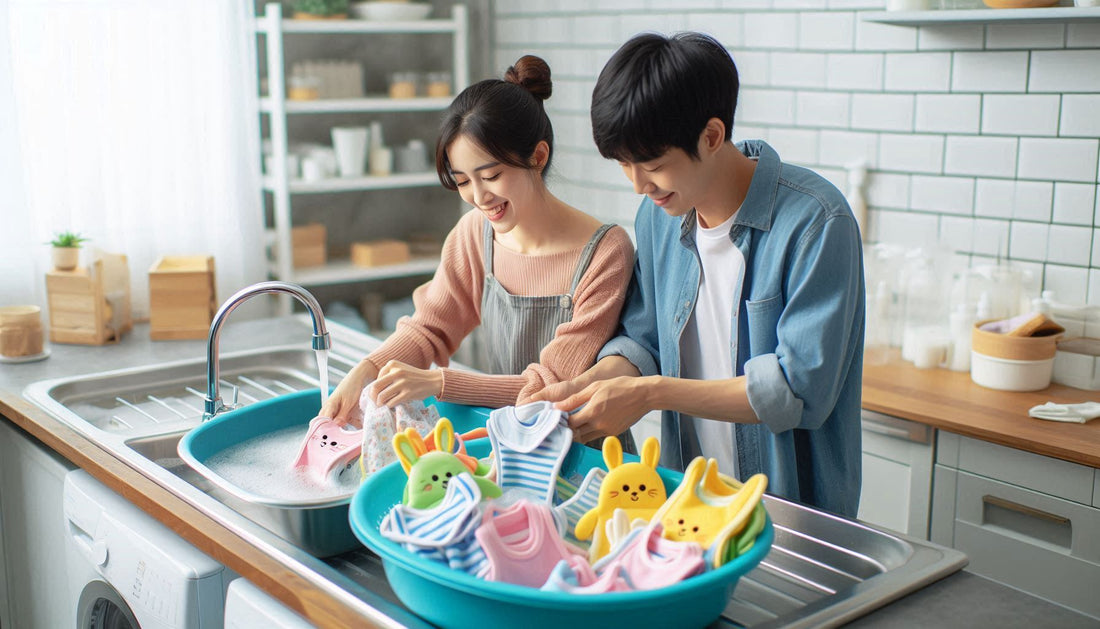As parents, we quickly realize that baby bibs are one of the essential items we use daily. Whether it's catching drool, spills from feeding time, or wiping away the mess after an adventurous meal, these little pieces of cloth play an important role in keeping our babies clean and comfortable. However, with frequent use, bibs can easily lose their softness and comfort if not washed correctly. But fear not! There are simple, effective ways to ensure your baby’s bibs stay soft and cozy for every feeding session. Let’s dive into the best practices for washing baby bibs without sacrificing their softness.
Understanding Baby Bibs: The Need for Softness
When it comes to baby bibs, softness is key. Babies have delicate, sensitive skin, and harsh materials can cause irritation or discomfort. Whether your bib is made of cotton, bamboo, or a soft polyester blend, you want to maintain its gentle texture for the sake of your little one. A rough or stiff bib, no matter how cute or functional, just isn’t comfortable against a baby’s soft skin.
But what happens when a favorite bib begins to lose its softness? Often, this occurs because of improper washing techniques, harsh detergents, or simply using the wrong washing method. Thankfully, you can keep your baby bibs as soft as new, even after multiple washes, with just a few tweaks to your routine.
Choosing the Right Detergent for Baby Bibs
The first step to keeping your baby bibs soft is choosing the right detergent. Traditional detergents may contain harsh chemicals, fragrances, and brighteners that could irritate your baby’s sensitive skin. When it comes to cleaning bibs, it’s best to opt for a mild, gentle detergent specifically formulated for babies. These detergents are free from harsh chemicals and fragrances, ensuring that your baby’s skin is protected while still getting the bibs clean.
For added softness, look for detergents that include natural fabric softeners. These are often plant-based and less likely to leave behind any residue that could stiffen the fabric. The goal is to clean the bibs thoroughly while retaining their softness, and a gentle detergent is the first step toward that goal.
Washing Temperature: Cold Is Best
Many parents make the mistake of washing their baby bibs in hot water, thinking that hot temperatures will clean them better. While hot water can sanitize and remove tough stains, it’s actually more likely to damage the delicate fibers in baby bibs. High temperatures can strip away the softness of the fabric and even cause it to shrink over time. For the best results, wash baby bibs in cold water.
Cold water is not only gentler on the fabric but also helps preserve the bibs’ colors and softness. This is especially important if you're using bibs made from materials like cotton or bamboo, which can become stiff and worn out with high temperatures. Washing in cold water ensures that your bibs stay soft and maintain their quality wash after wash.
Gentle Wash Cycle
It’s tempting to throw all your laundry into one load, but when it comes to baby bibs, a little extra care goes a long way. Use the gentle or delicate wash cycle on your washing machine to avoid the rough agitation of heavier cycles. The gentle cycle is specifically designed to protect delicate fabrics, preserving both softness and longevity.
While some bibs are machine washable, there are others that require a little more attention. For example, bibs with embellishments, like embroidery or appliqué designs, may need to be washed by hand or in a mesh laundry bag to avoid damage. If you’re unsure, always check the care instructions on the bib’s label before washing to avoid any mishaps.
Skip the Fabric Softener
While fabric softener seems like the natural choice for maintaining softness, it’s not always the best option for baby bibs. Fabric softeners are often made with chemicals that can leave residue on fabrics, which might irritate your baby’s skin. They can also build up over time, causing the fabric to lose its breathability and absorbency.
If you prefer to use a fabric softener, try switching to a natural alternative, such as white vinegar. Adding a small amount of vinegar to the rinse cycle can help soften fabrics without the chemicals or fragrances found in traditional softeners. Plus, it’s an eco-friendly choice that helps break down detergent residues, keeping your baby’s bibs fresh and soft.
Drying Baby Bibs: Air Dry vs. Machine Dry
When it comes to drying your baby's bibs, the method you choose can make a significant difference in their softness. While it may be tempting to toss the bibs into the dryer, the heat can cause the fabric to shrink or lose its softness. Instead, air drying is your best option for maintaining the quality of the bibs.
Simply lay the bibs flat on a drying rack or hang them up to air dry. This slow drying method helps retain the softness of the fabric and keeps them in their original shape. If you’re pressed for time and need to use the dryer, opt for a low-heat or tumble dry setting. High heat can be too harsh on delicate fabrics, leading to stiffness and wear.
Avoid Overwashing
While it’s important to keep your baby’s bibs clean, you don’t need to wash them after every single use. Overwashing can wear out the fabric faster, causing it to lose its softness. Instead, only wash bibs when they’re visibly soiled or after several uses. This not only helps preserve the fabric’s softness but also saves you time and energy.
In between washes, you can spot clean bibs with a damp cloth or rinse them with cool water to remove any minor stains. This way, you’re ensuring your baby’s bibs stay fresh and soft without over-washing and risking damage to the material.
Consider Bamboo Baby Bibs for Ultimate Softness
If you're looking for an option that offers natural softness, you may want to consider bamboo baby bibs. Bamboo fabric is known for its incredible softness and hypoallergenic properties, making it a great choice for babies with sensitive skin. Not only is bamboo naturally soft, but it also has moisture-wicking properties that can help keep your little one dry and comfortable.
Bamboo bibs are easy to care for and maintain their softness wash after wash. Like cotton, bamboo fabric should be washed in cold water on a gentle cycle and air-dried to retain its luxurious feel. With their natural antibacterial properties, bamboo bibs can help reduce the risk of skin irritation, making them an excellent option for your baby’s sensitive skin.
Happy Matty’s Approach to Soft Baby Bibs
When it comes to baby products, Happy Matty stands out for its focus on quality and comfort. Known for their ultra-soft, absorbent, and durable bibs, Happy Matty understands the importance of softness when it comes to baby care. Their bibs are crafted with the finest materials, ensuring that every product is gentle on your baby’s skin while offering superior functionality.
Happy Matty bibs are designed to withstand frequent washing without losing their softness. Whether you’re looking for bibs that feature playful patterns or simple, neutral designs, Happy Matty offers a range of bibs that combine both style and comfort. Best of all, these bibs are easy to care for, making them a practical choice for busy parents who want to keep their babies clean and comfortable.
Suggested Reading: How to Make Baby’s Crib More Comfortable with Animal Print Bedding
Conclusion: Keep Your Baby's Bibs Soft and Cozy with Care
In conclusion, washing baby bibs without losing their softness is entirely possible with the right techniques and products. From choosing the right detergent to air drying your bibs and avoiding fabric softeners, these steps will help preserve the softness and quality of your baby’s bibs. By adopting a gentle, mindful approach to washing, you can ensure that your little one continues to enjoy the comfort of their bibs, no matter how many meals they go through.
If you're on the hunt for baby bibs that combine softness, durability, and functionality, check out Happy Matty's collection at https://happymattystore.com/. Their bibs are designed with your baby’s comfort in mind, offering a great balance of quality and softness that you’ll love.

